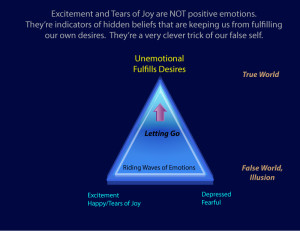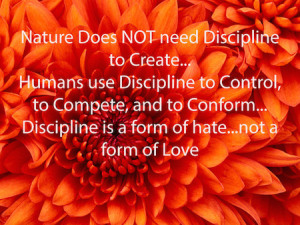I’m often asked about excitement and tears of joy. In both cases, an emotion appears to be positive until we take a closer look.
The Gift of Emotions
Our emotions were designed to let us know when we’re thinking something false. We think; then we get feedback. If that feedback is emotion, then what we just thought was false. That thought won’t take us to our true desires. It will take us deeper into the illusion of pain, suffering, and problems.
This gets confusing in relationships. Often, we’re listening to another; and we feel emotion when we take their false thought or belief into our body-mind. If we don’t let their belief go, it sits there accumulating power; and it keeps us from getting what we want in life. We don’t realize we have this belief; and often it’s revealed in excitement or tears of joy. But we don’t catch the opportunity to let it go because society tells us these are positive emotions.
For most of us, we don’t realize how many beliefs we’ve accepted into our body-mind until we start letting go; it’s the supreme, “Oh fuck,” moment in life. We focus on letting go of beliefs that generate “negative” emotion, but emotion isn’t positive or negative. It always means the same thing; what we’re thinking right now is false. Excitement and tears of joy aren’t positive emotions; but they’re emotions. They’re a form of psychological reversal that looks positive; consequently, they can be difficult to decode once labeled. We don’t want to let them go if we label them positive.
Excitement
Excitement is a label that we give to emotion when we associate it with something we want. The guy or girl we like smiles at us. We get an interview for the job we desire. We think the emotion is related to the good news. But the emotion is coming from what lies beneath the good news. The event triggered our beliefs which generated the emotion. We need to turn inward and watch our mind to see what’s actually causing the emotion. The belief might be something like, “I never believed this would happen.” “This is too good to be true.” “I don’t deserve this.” We don’t want those beliefs in our mind. They’re false. The beliefs could be triggering what appears to be guilt or shame if we’re conditioned to gravitate toward pain or martyrdom. Some might fear it’s a temptation by Satan. We want to let go of whatever we discover.
Maybe something already happened that’s generating excitement. Let’s say we won the lottery. That excitement might mean that we just got a false desire, or we have beliefs about lottery winners becoming selfish. Our True Self is giving us fair warning. We could be headed for trouble if we don’t let go. In the moment, we focus on the outer event; we don’t hear what our mind is saying. We don’t recognize the cause of the emotional response. If we find the cause of the emotion, we just might avoid something bad in the future.
The most dangerous false interpretation of excitement is when it’s really fear. If we fear something, it’s wise to let go of the cause of that fear, not head straight into the fear and call it excitement. That’s just asking for trouble.
True Desire
When we fulfill a true desire, the normal reaction is more like, “That makes sense.” If we have no beliefs, it’s obvious that the desire will come to us. We won’t be all nervous and jumpy about it. When we’ve been letting go, we notice the improvement in our mind; and by the time that we get our desire, it just seems logical that it would happen that way.
Many people believe and teach that emotions are creative. This came from ancient occult teachings. But think about that. If emotions create our life, and we aren’t in a position where we can project the potential unwanted manifestations on to others (because we aren’t an authority figure), then it’s just a matter of time before our fears manifest. When we use our emotions backwards; our life is like riding ocean waves. We’ll get excited and happy when we get what we want and depressed and fearful when we don’t. We’ll always be in a state of emotion; we’ll just label our emotional state different based on what just happened.
People often challenge me on this. They say, “I don’t want to give up excitement.” But they don’t realize that keeping excitement means keeping the other half of the triangle bottom, disappointment.
Tears of Joy
Tears of Joy are the product of very strong emotional reaction. But it’s not the joy that’s producing the tears. Perhaps we’re watching a movie and lovers find each other after years of being apart. We say we’re joyful in their reunion. So why do we cry? Emotion always means our thoughts are false. We have to turn inward again and watch our mind to know why. Maybe we’re thinking, “I wish I had love like that.” “I wish I could find my lost love.”
We’re happy that they got what they desired; but we’re sad that we aren’t getting what we want. They’re tears of sadness or disappointment about our life, not joy for them. We don’t see this because we’re not watching our mind when we have tears of joy. We’re looking outside of us at something we see or hear. Our attention is on something good or wanted; but our mind is thinking something false. It’s a trick.
In my experience, watching my mind during the tears of joy or excitement often reveals causal beliefs that explains why I’ve not fulfilled my desires. They’re liking finding a diamond. If I turn my focus inward, and let go of the false thought or belief, the tears of joy or excitement go quickly. And I’m one step closer to freedom and fulfilling my own true desires.



